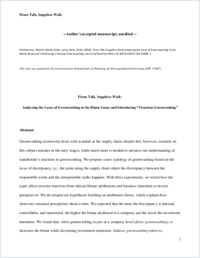Firms talk, suppliers walk : analyzing the locus of greenwashing in the blame game and introducing ‘vicarious greenwashing’
- Pizzetti, Marta Marketing Department, TBS Business School, Toulouse, France
- Gatti, Lucia Sustainability Management School (SUMAS), Gland, Switzerland
- Seele, Peter Facoltà di comunicazione, cultura e società, Università della Svizzera italiana, Svizzera
-
23.12.2019
Published in:
- Journal of business ethics. - 2019, p. 51 p
English
Greenwashing is a phenomenon that is linked to scandals that often occur at the supply-chain level. Nevertheless, research on this subject remains in its infancy; much more is needed to advance our understanding of stakeholders’ reactions to greenwashing. We propose here a new typology of greenwashing, based on the locus of discrepancy, i.e. the point along the supply-chain where the discrepancy between ‘responsible words’ and ‘irresponsible walks’ occurs. With three experiments, we tested how the different forms of greenwashing affect stakeholders’ reactions, from both ethical (blame attributions) and business (intention to invest) perspectives. We developed our hypotheses by building on attribution theory, which seeks to account for how observers construct perceptions about events. We had anticipated that the more internal, controllable and intentional the discrepancy is, the greater the blame attributed to a company is, and the lower the intention to invest will be. When greenwashing occurs at a company level (direct greenwashing), this results in a higher level of blame attribution, while the intention to invest falls. Indirect greenwashing refers to a misbehaviour perpetrated by a supplier who claims to be sustainable, and which results in a less negative impact on a supplied company. We also propose the vicarious greenwashing, which occurs when the behaviour of a supplier is in breach of a company’s claims of sustainability. This type of greenwashing is nevertheless detrimental to investment. The findings here advance our understanding of how greenwashing shapes stakeholders’ reactions, and highlight the need for the careful management of the supply-chain.
- Language
-
- English
- Classification
- Economics
- License
-
License undefined
- Open access status
- green
- Identifiers
-
- RERO DOC 329946
- DOI 10.1007/s10551-019-04406-2
- ARK ark:/12658/srd1319409
- Persistent URL
- https://n2t.net/ark:/12658/srd1319409
Statistics
Document views: 301
File downloads:
- Fulltext: 3066
